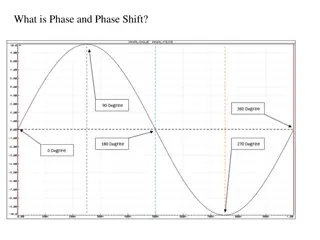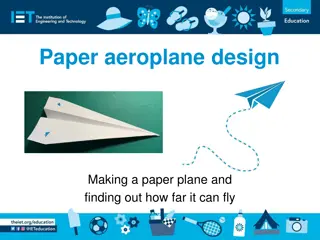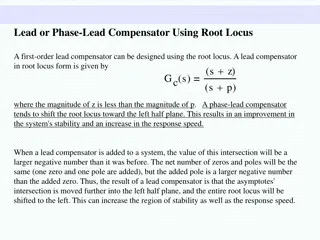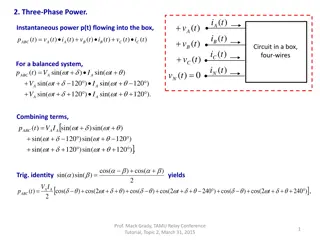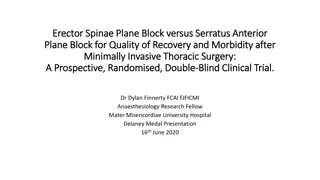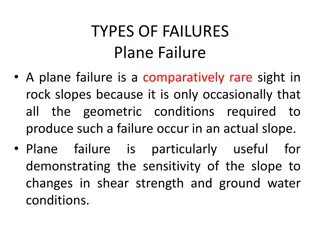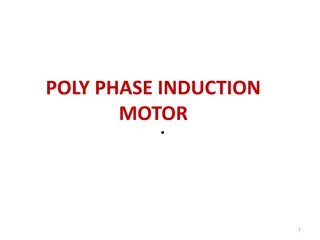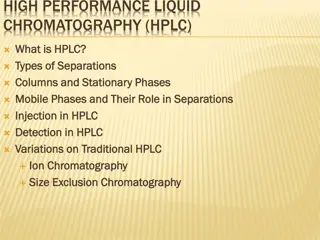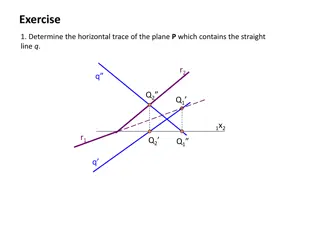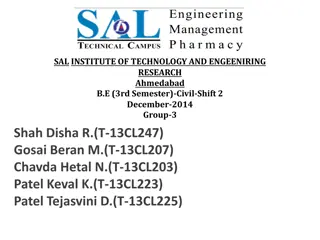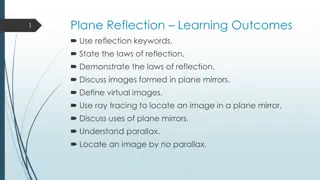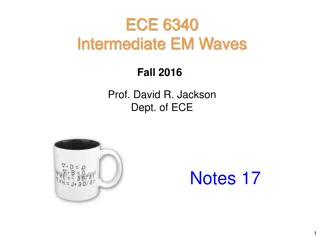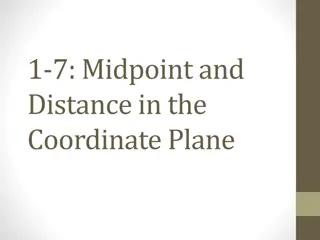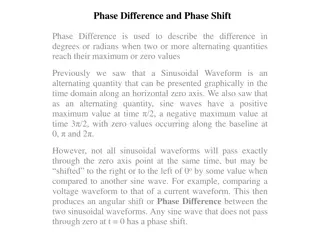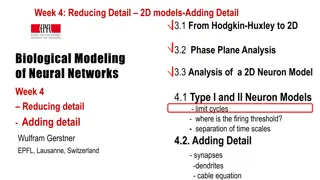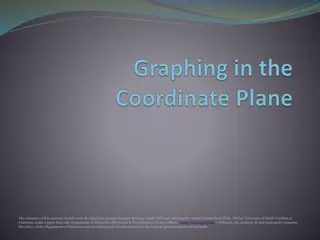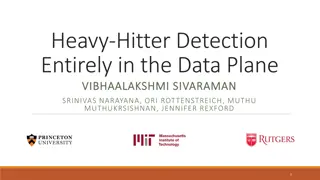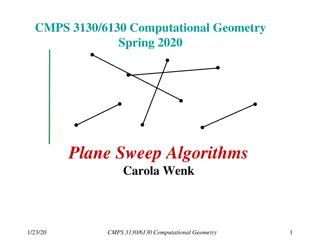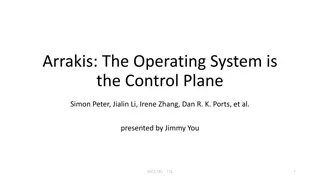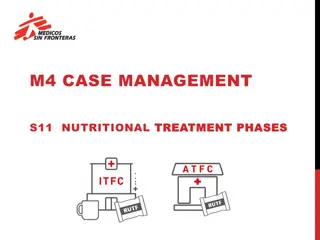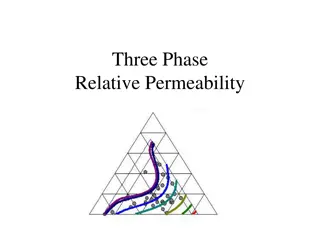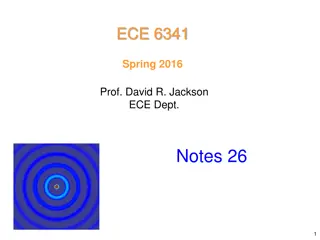Understanding Reflection and Transmission of Plane Waves in Electromagnetic Fields
The notes discuss the reflection and transmission of plane waves, wave vectors, fundamental polarizations (TMz and TEz), and boundary conditions at material interfaces. It covers the behavior of different types of plane waves, their interactions, and the conditions that govern their propagation thro
7 views • 57 slides
Understanding RC Phase Shift Oscillators
Dive into the world of RC phase shift oscillators, exploring the concepts of phase and phase shift in electronic circuits. Learn how cascading RC networks can achieve specific phase shifts, the role of impedance, and the practical applications of RC feedback networks in oscillator circuits. Discover
1 views • 18 slides
Paper Plane Design and Flight Test
Explore the art of making a paper plane and testing its flight capabilities. Learn about aerodynamics, gravity, lift, and thrust involved in flight. Follow step-by-step folding instructions to create your paper plane. Experiment with different throwing techniques to observe how they affect the fligh
0 views • 8 slides
Survive Winter Plane Crash - Team Problem Solving Game Overview
Engage in the 'Survive Winter Plane Crash' team problem-solving game to learn about collaboration, prioritization, and group dynamics. Navigate a scenario of survival in Northern Canada after a plane crash, where you must rank and prioritize items for your survival. Suitable for staff, quality impro
0 views • 17 slides
Understanding Lead and Phase-Lead Compensators
Lead and Phase-Lead compensators play a crucial role in improving system stability and response speed. By using the root locus and frequency response methods, these compensators shift the root locus toward the left half-plane, adding positive phase over the frequency range. This leads to increased s
0 views • 16 slides
Understanding the Three Stages of Project Life Cycle
The project life cycle consists of three key stages: pre-investment phase, construction phase, and normalisation phase. The pre-investment phase involves objective formulation, demand forecasting, and cost-benefit analysis. The construction phase focuses on building project infrastructure and invest
1 views • 5 slides
Secure State Migration in the Data Plane Overview
The data plane synchronization protocol for secure state migration addresses the challenges of untrusted networks, ensuring completeness, low overhead, and integrity guarantee. P4Sync offers a solution by running in the data plane with minimal local control plane involvement, ensuring completeness,
2 views • 21 slides
Understanding Three-Phase Power Systems and Instantaneous Power Flow
This detailed content delves into three-phase power systems, analyzing instantaneous power flow, balanced circuits, and trigonometric calculations. It explores the concept of constant three-phase power and provides insights into the analogy of a piston engine with infinite cylinders. The data includ
2 views • 9 slides
Understanding Phase Equilibria in Physical Pharmacy
Delve into the complexities of states of matter, phase equilibria, and the phase rule as explained by Assistant Prof. Dr. Fouad Al-saady in the context of physical pharmacy. Learn about phase definitions, phases in different systems, and examples illustrating phase differentiation in various substan
0 views • 22 slides
Comparison of Erector Spinae Plane Block vs Serratus Anterior Plane Block in Thoracic Surgery Recovery
Minimally Invasive Thoracic Surgery often results in severe post-operative pain, typically managed with the Serratus Anterior Plane (SAP) block. This study compared the quality of recovery and morbidity between SAP and the relatively new Erector Spinae Plane (ESP) block. Results showed that ESP prov
1 views • 10 slides
Understanding Plane Failures in Rock Slopes
Plane failures in rock slopes are rare but significant, indicating sensitivity to changes in shear strength and groundwater conditions. Geometrical conditions must be met for such failures to occur, including specific alignments and interactions between the sliding plane and slope face. Analysis inv
0 views • 22 slides
Understanding Poly Phase Induction Motor Construction
An induction motor is comprised of a stator and rotor, with the stator featuring a 3-phase winding fed from a 3-phase supply. The rotor comes in two types - squirrel-cage and phase wound. The squirrel-cage rotor consists of heavy bars tightly pressed on the shaft, while the phase wound rotor has a 3
0 views • 47 slides
An Overview of High Performance Liquid Chromatography (HPLC)
High Performance Liquid Chromatography (HPLC) is a powerful analytical technique used for separating and identifying compounds in a mixture. It involves a mobile phase and a stationary phase to achieve separation based on different physicochemical properties. The mobile phase plays a crucial role in
0 views • 20 slides
Understanding the Phase Rule in Physical Pharmacy: Two Component Systems and Equilibrium Phases
The Phase Rule is essential in determining the state of a system based on components and phases. This study explores two-component systems in physical pharmacy, illustrating miscibility behaviors and equilibrium phases through diagrams and explanations. Understanding binodal curves, tie lines, and t
0 views • 12 slides
Determining Plane Traces and Projections in Geometry
This content covers various exercises related to determining horizontal and vertical traces, as well as projections of lines and points in a given plane. It includes scenarios with parallel and intersecting lines, as well as the determination of planes using points and non-collinear points. The exer
0 views • 15 slides
Introduction to Plane Table Surveying in Civil Engineering
Plane table surveying is a graphical and cost-effective method used for surveying small-scale areas. This method involves simultaneous plotting of the survey while in the field, ensuring accuracy and efficiency. Key principles, instruments, setting up procedures, advantages, disadvantages, and commo
1 views • 37 slides
Understanding Reflection in Plane Mirrors
Explore the laws and principles of reflection in plane mirrors through detailed explanations and visual demonstrations. Learn about diffuse and specular reflection, virtual images, ray tracing techniques, and the significance of parallax. Discover how to locate images using reflection and understand
0 views • 17 slides
Understanding Plane Surfaces in Engineering Drawings
Exploring the concept of plane surfaces in technical drawings, this informative content covers the definition, characteristics, and positioning of planes in space relative to projection planes. It also delves into the projections of various plane surfaces parallel, perpendicular, and inclined to pri
0 views • 9 slides
Understanding the Coordinate Plane: Unit 1 Lesson 12
Engage in learning about the coordinate plane, axes, quadrants, and coordinates to accurately position points and understand their locations in this comprehensive lesson. Practice naming quadrants and interpreting ordered pairs to navigate the coordinate plane effectively.
1 views • 22 slides
Understanding General Plane Waves in Electromagnetic Theory
This study focuses on the analysis of general plane waves in electromagnetic theory, covering topics such as the general form of plane waves, Helmholtz equation, separation equation, wavenumber vector, Maxwell's equations for plane waves, and the symbolic representation of plane waves. The content d
0 views • 41 slides
Integrated Verification and Repair in Control Plane
Modern networks face challenges from incorrect configurations affecting millions of users. This presentation discusses the integration of verification and repair processes into the control plane, aiming for consistent and policy-compliant network operations. It explores the complexities of network c
0 views • 16 slides
Exploring Management Plane Analytics in Networking
In the realm of networking, Management Plane Analytics (MPA) plays a crucial role in defining and configuring network structures, analyzing the impact of management practices on network health, and predicting network issues. This article delves into the significance of analyzing the management plane
1 views • 19 slides
Midpoint and Distance in Coordinate Plane
This content covers the concepts of finding midpoints and distances in the coordinate plane. It explains how to calculate the midpoint of line segments on a number line and in a coordinate plane using the midpoint formula. Additionally, it discusses finding the distance between two points using the
0 views • 7 slides
Understanding Phase Difference and Phase Shift in Sinusoidal Waveforms
Phase difference and phase shift describe the angular displacement of sinusoidal waveforms in degrees or radians. These concepts are crucial in analyzing the relationship between alternating quantities such as voltage and current. The phase angle determines the shift of a waveform along the horizont
1 views • 26 slides
Exploring 2D Neuron Models and Phase Plane Analysis
Dive into the transition from Hodgkin-Huxley to 2D neuron models, understanding phase plane analysis, and analyzing different neuron types like Type I and II models with a focus on limit cycles, firing threshold, and separation of time scales.
0 views • 43 slides
Chi: A Scalable and Programmable Control Plane for Distributed Stream Processing
Distributed stream processing systems are increasingly crucial for various production use cases, such as real-time dashboards, machine learning, and interactive debugging. The challenges of handling large variability in production ingestion workloads and high-degree data skew in queries are addresse
1 views • 20 slides
Understanding the Coordinate Plane and Graphing Techniques
Explore the basics of the coordinate plane, including quadrants and graphing ordered pairs. Learn how to identify the x and y coordinates, plot points accurately, and graph polygons in the coordinate plane. Enhance your understanding of geometry and spatial reasoning through practical examples and v
1 views • 8 slides
Geometry in the Coordinate Plane
The content discusses various topics related to geometry in the coordinate plane, including finding points on a line that are a specific distance apart, classifying polygons by their sides, determining perimeters of polygons with given vertices, and calculating areas of triangles and polygons. It pr
0 views • 12 slides
Data Plane Heavy Hitter Detection and Switches: A Comprehensive Overview
In this comprehensive guide, explore the concepts of heavy-hitter detection entirely in the data plane, the significance of detecting heavy hitters, emerging programmable switches, existing techniques, and constraints faced in processing heavy flows. Discover the motivation behind the Space-Saving A
0 views • 33 slides
Plane Sweep Algorithms in Computational Geometry
Plane sweep algorithms are a powerful technique in computational geometry for solving various problems efficiently. By simulating the sweep of a vertical line across the plane and maintaining a cleanliness property, these algorithms can process events at discrete points in time to update the status
0 views • 26 slides
Characterization of 3G Control-Plane Signaling Overhead
This study focuses on characterizing the control-plane signaling overhead in 3G networks caused by the initiation and release of radio resources with raw IP data packets. It explores the impact of massive signaling messages triggered by data transfer on 3G networks, aiming to validate a data-plane a
0 views • 22 slides
Arrakis: The Operating System is the Control Plane
Arrakis is an innovative operating system that focuses on the control plane, designed to optimize performance in data centers by skipping the kernel for data-plane operations, retaining classical server OS features, and providing appropriate OS/hardware abstractions. It addresses slow system calls,
0 views • 30 slides
Overview of 5G System Architecture and User Plane Functionality
This content showcases various aspects of 5G system architecture, including system handover, non-roaming architecture, service-based architecture, and user plane functionality. It delves into the control plane functions, user plane functions, and core network endpoints of the 5G network. The images
0 views • 49 slides
Understanding Nutritional Treatment Phases in Pediatric Malnutrition
This session covers the different phases of nutritional treatment in pediatric malnutrition programs, focusing on objectives, specifics, and criteria for transitioning between phases. An illustrative case of Annika, a 3-year-old in the Transition Phase, is provided for practical application and unde
0 views • 5 slides
Understanding Three-Phase Relative Permeabilities in Reservoir Engineering
Explore the application, correlations, and traditional assumptions of three-phase relative permeabilities in reservoir engineering. Learn about saturation-dependencies, occupancy models, and the challenges of measuring three-phase relative permeabilities. Discover how to calculate three-phase permea
0 views • 14 slides
Understanding EM Plane-Wave Transformation Notes
In these notes by Prof. David R. Jackson for ECE 6341, the concept of EM plane-wave transformation is discussed in detail. It covers topics such as the relationship between Er and Ar, Hr and Fr, field components representation, integration formulas, and notation usage like Harrington notation. The c
0 views • 17 slides
Understanding Microbial Growth: Phases and Dynamics
Microbial growth is defined as an increase in cellular constituents leading to a rise in microorganism size or population. The growth of bacterial cells is characterized by distinct phases such as lag phase and exponential phase. During the lag phase, cells are synthesizing new components before div
0 views • 21 slides
Understanding Bacterial Growth and Nutritional Requirements
Bacterial growth involves processes like binary fission, exponential phase, and stationary phase. Factors influencing growth include nutrient availability, oxygen levels, and toxic waste accumulation. Lag phase precedes exponential growth, where cells prepare for division. Stationary phase occurs wh
0 views • 11 slides
Advanced Imaging Techniques for Three-Phase Flows in Reactor Systems
Gas-liquid-solid reactor systems require advanced measuring techniques to understand complex three-phase flows. Multi-Phase Flow Decomposition using Electrical Capacitance Volume Tomography (ECVT) offers innovative solutions for visualizing and quantifying phase hold-up distributions and dynamic cha
0 views • 17 slides
Moving to the Design Phase: Feasibility Phase Checklist
The transition requirements for moving to the Design Phase include the Water Fund being deemed feasible, resources committed for design, and a formal decision made. The Feasibility Phase Checklist covers governance, science, finance, implementation, and communications aspects. The high-level action
0 views • 4 slides

